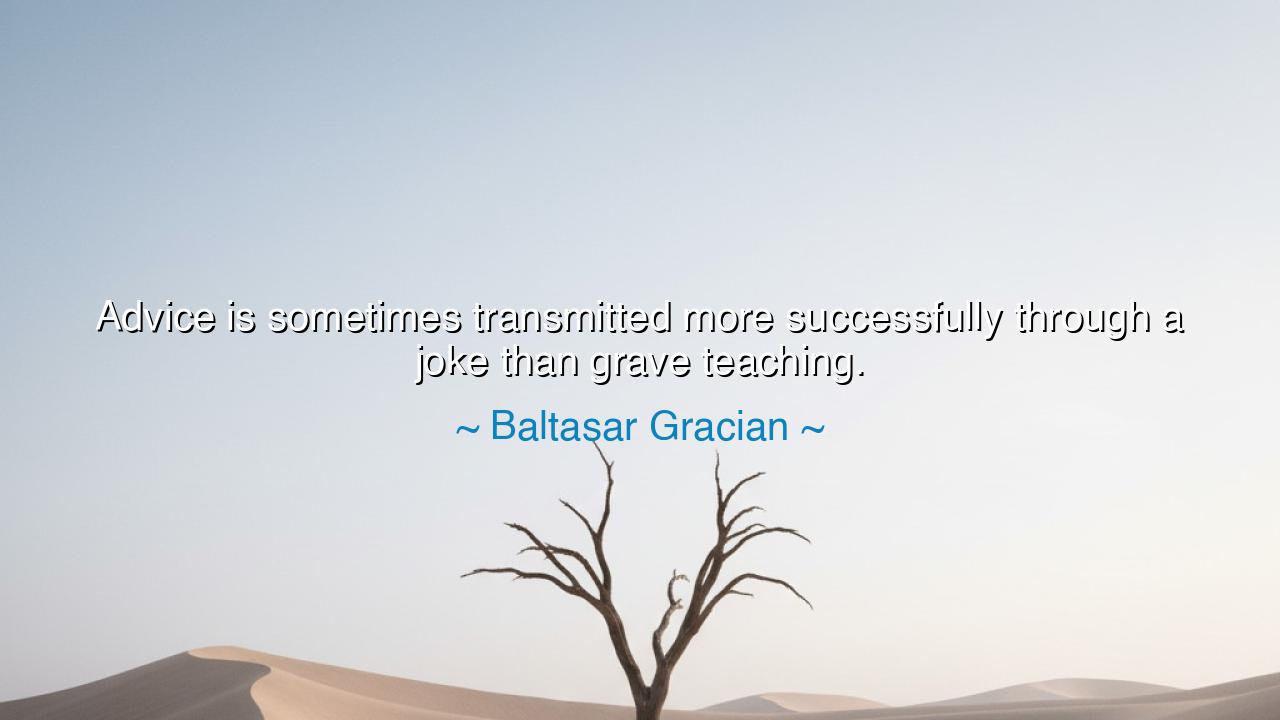
Advice is sometimes transmitted more successfully through a joke






Hear the wisdom of Baltasar Gracián, the Jesuit sage of Spain, who in his Oráculo Manual gave this insight: “Advice is sometimes transmitted more successfully through a joke than grave teaching.” In this saying lies the truth that wisdom clothed in laughter often reaches the heart more swiftly than solemn words wrapped in severity. For men resist the stern rebuke, but they yield to the gentle thrust of wit. What seems light at first carries weight in secret, and what is received with a smile may linger longer than what is endured with a frown.
The meaning is that the human spirit often bristles against correction. Direct admonition feels heavy, pride resists it, and dignity pushes it away. But when the same truth is spoken with humor, it enters softly, disarming resistance. The listener laughs, yet in laughing he receives the lesson, hidden within the jest. In this way, jokes can become vessels of truth, carrying wisdom past the barriers of ego, while “grave teaching” often shatters against them.
Consider the example of the court jesters of old Europe. They were the only ones permitted to mock kings without punishment. Their wit, their jokes, concealed truths that no advisor dared speak. In the mirth of laughter, kings were reminded of their folly, their vanity, or their tyranny. A fool’s cap became a crown of wisdom, for humor conveyed counsel where solemn warnings would have been silenced. Thus Gracián, a master of subtle influence, recognized that often the lighter word carried the heavier weight.
History also remembers the words of Abraham Lincoln, who in times of great division often wielded humor. His stories and jokes softened enemies and won allies. In the halls of power, where stern speeches might harden hearts, his gentle wit made opponents lower their guard. Yet behind each tale was counsel, behind each jest was strategy. He knew, as Gracián knew, that the laughter of men opens the door through which truth may enter.
This saying is not to mock seriousness, but to remind us of balance. There are moments when grave teaching is needed, when the thunder of truth must sound without disguise. Yet if every lesson is thunder, the ears grow deaf. The wise teacher, the skillful parent, the prudent friend, knows when to temper severity with humor, when to weave laughter with counsel. For in such blending, advice becomes not only bearable but memorable.
O children of tomorrow, learn this lesson well: when you must offer counsel, choose not always the path of severity. Sometimes a gentle smile, a humorous story, or a witty remark carries the lesson further than solemn words. Speak so the heart may open, not only the ear. A jest without wisdom is empty, but wisdom without kindness may be unbearable. Unite the two, and your words will live.
Therefore, practice this: when correcting, cloak truth in gentleness; when guiding, weave laughter with light. Let your words fall not as heavy stones, but as sparks that kindle thought. For often, the jest is the chisel that shapes pride, while the sermon is the hammer that shatters it. And it is better to shape than to break.
Thus Gracián’s words endure across centuries: “Advice is sometimes transmitted more successfully through a joke than grave teaching.” Take this wisdom with you—learn to laugh even as you teach, and to teach even as you laugh. For laughter, when joined with truth, is one of the most powerful teachers under heaven.






AAdministratorAdministrator
Welcome, honored guests. Please leave a comment, we will respond soon